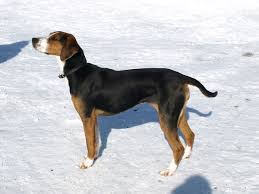
Dumfriesshire hound
Conditions of detention
Dumfriesshire Hounds are best suited for rural environments where they have plenty of space to roam and explore. They thrive in homes with large yards or properties where they can engage in their natural hunting instincts. While they can adapt to more confined living conditions, they require significant daily exercise.
Useful Fact: These hounds are pack animals and enjoy the company of other dogs, making them well-suited for multi-dog households.
Nutrition and diet
A balanced diet rich in protein and essential nutrients is crucial for the Dumfriesshire Hound’s health and vitality. High-quality dog food, tailored to their age, size, and activity level, is recommended. Fresh water should always be available.
Useful Fact: Monitoring their diet to prevent overeating is important, as they are active dogs and can be prone to obesity if not properly exercised.
Health
Dumfriesshire Hounds are generally robust and healthy dogs, but they can be prone to certain genetic conditions like hip dysplasia and ear infections due to their floppy ears. Regular veterinary check-ups and maintaining a healthy lifestyle are essential.
Useful Fact: Regular exercise and a balanced diet can help prevent joint issues and maintain overall health.
Grooming and care
The Dumfriesshire Hound has a short, dense coat that requires minimal grooming. Weekly brushing will help keep their coat clean and healthy, and occasional baths are recommended as needed. Their coat is typically tricolor, including black, white, and tan markings.
Useful Fact: Regular ear cleaning is important to prevent infections, especially in breeds with floppy ears.
Education and training
Dumfriesshire Hounds are intelligent and eager to learn, making them relatively easy to train. They respond well to positive reinforcement techniques, such as treats and praise. Early training and socialization are essential to develop good behavior and obedience.
Useful Fact: These hounds have a strong prey drive, so training them to respond to recall commands is particularly important for their safety.
Toys and entertainment
Dumfriesshire Hounds require plenty of mental and physical stimulation. Interactive toys, puzzle toys, and activities that challenge their hunting instincts, such as scent trails or fetch games, are ideal.
Useful Fact: Providing a variety of toys and changing them regularly can help keep the Dumfriesshire Hound engaged and prevent boredom.
Safety
Due to their strong hunting instincts, it’s crucial to keep Dumfriesshire Hounds in a secure, fenced area when outside. They should always be on a leash when not in a confined space to prevent them from wandering off in pursuit of small animals.
Useful Fact: Microchipping your Dumfriesshire Hound can help ensure they are returned to you if they ever get lost.
Accessories
Dumfriesshire Hounds benefit from durable accessories, including collars, leashes, and harnesses. Given their active nature, investing in high-quality gear is important for their safety and comfort.
Useful Fact: A sturdy, comfortable bed is essential for their rest and recovery after a day of activity.
Socialization
Early and consistent socialization is key to developing a well-rounded Dumfriesshire Hound. Expose them to different people, environments, and other animals to ensure they grow up to be confident and well-mannered.
Useful Fact: Puppy classes can be an excellent way to start socialization and training in a controlled environment.
Travel and Transportation
Dumfriesshire Hounds are generally good travelers if they are introduced to it gradually and positively. They should be secured in a travel crate or with a dog seat belt harness when in a vehicle to ensure their safety.
Useful Fact: Frequent breaks during long trips are important to allow them to stretch, hydrate, and relieve themselves.
Behavior and psychology
Dumfriesshire Hounds are known for their loyalty, intelligence, and affectionate nature. They form strong bonds with their families and are excellent with children. They can be independent but are generally friendly and sociable dogs.
Useful Fact: Providing them with consistent routines and positive reinforcement helps to foster their sense of security and well-being.
Legal aspects
In some areas, owning a Dumfriesshire Hound may require registration with local authorities or kennel clubs. It’s important to be aware of and comply with any breed-specific legislation in your area.
Useful Fact: Keeping your dog’s vaccinations and licenses up to date is crucial for legal compliance and their health.


